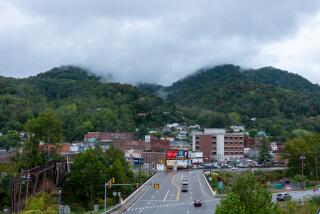Review: J.D. Vance’s ‘Hillbilly Elegy’ provides a window into the pain and anger of Trump’s America
J.D. Vance was born into love, abuse and decline. A hillbilly with Kentucky roots, he survived a drug-addicted mother, gun-packing relatives and a culture of defiance and self-doubt that coalesced into a political voice that has made Donald Trump an odd savior for a swath of white, working-class America.
Vance’s unapologetic autobiography, “Hillbilly Elegy: A Memoir of a Family and Culture in Crisis,” is a poem to the hills and hollers of his childhood where a blue-collar sentiment often blames government and big business for poverty, addiction, violence and families in disarray. The book echoes with an insider’s righteousness of a boy — weaned on the cursing and strength of his Mamaw — who grows up to reject that defeatist mind-set by enlisting in the Marines and graduating from Yale Law School.
“Hillbilly Elegy” is a white man’s take on a culture that is at once stereotyped and mythologized. If read alongside Ta-Nehisi Coates’ “Between the World and Me,” a black father’s profound meditation on the racism that may engulf his son, the two would present portraits of the most bitter and volatile forces at play in America today.
The fascinating and flawed characters in Vance’s work do not endure racism but they struggle against a legacy of poor education and caricatures that have championed reality TV shows like “Duck Dynasty” and brought epithets such as “white trash” and “rednecks.”
Vance emerges as a conservative who disdains right-wing “conspiracy mongers” and “fringe lunatics” who have tainted politics with a divisive pessimism over the diminishment of the American dream. Wall Street, wage stagnation, foreign competition and the closing of mines and mills have gutted Appalachia and the Rust Belt. But Vance worries that the hard work and self-reliance that were the creed of that dream have succumbed to welfare, crime, addictions and broken communities.
“President Obama came on the scene right as so many people in my community began to believe that the modern American meritocracy was not built for them,” Vance writes. “We know we’re not doing well. We see it every day: in the obituaries for teenage kids that conspicuously omit the cause of death (reading between the lines: overdose), in the deadbeats we watch our daughters waste their time with.
“Barack Obama strikes at the heart of our deepest insecurities. He is a good father while many of us aren’t. He wears suits to his job while we wear overalls, if we’re lucky enough to have a job at all. His wife tells us that we shouldn’t be feeding our children certain foods, and we hate her for it — not because we think she’s wrong but because we know she’s right.”
Trump, whose father gave him a fortune, and Vance, whose father gave him up for adoption, are speaking of the same audiences but with opposing messages.
— Jeffrey Fleishman on ‘Hillbilly Elegy’
Hardly insights you’d hear at a Trump rally. Trump, whose father gave him a fortune, and Vance, whose father gave him up for adoption, are speaking of the same audiences but with opposing messages. Trump peddles mistrust and a belief that the white working class has been decimated by a liberal government whose trade, immigration and environmental policies killed jobs in the coal fields and shipped other work overseas. The presidential candidate’s bluster is much keener on projection than introspection.
Vance accepts that the blue-collar world has been jolted by many of the same factors. His prescriptions, however, are harder to hear and often push the blame back on individuals. His lessons can appear preachy and simplistic. The memoir would have benefited from a bit more history of how the timber and coal industries — economic saviors that often ran on duplicity — dominated an Appalachia isolated by geography and tradition. Mechanization and the decline of coal forced significant migrations from the region but many who left yearned for their hollers. Perhaps nowhere else in America does the land figure so prominently in the soul.
That reverence struck me often in the early 1990s when, as a national newspaper correspondent, I traveled the back roads of Appalachia. Young people were heading for textile and furniture mills in North Carolina or construction jobs in Georgia. Many who stayed turned to handouts and prescription drug abuse. It was a land in torment, but also a world of unadorned poetry, where a man “as old as God’s dog” could sit on a porch and tell you that snow blew hard and pure beyond the coal tipple.
It was a cruel paradox. For all its natural riches, the region, rugged and hard to develop, could not provide for those who loved it. That reality was made starker by underfunded schools and a lack of retraining programs. Men felt torn and unprepared, willing to reinvent but not knowing what to do when coal company tools were wrested from their hands. Pride was bundled with the land and many felt insecure wandering past their mountain borders.
“I love the Lord. I love my wife. But here on this earth I will never get more peace than being in the West Virginia mountains,” one man told me. “There’s nothing like hitting the woods before daylight, watching the fog rolling up the hollows and seeing the silhouettes of deer in the trees. It’s God’s country, son. I was born there, and there is where I became a man. I would never have left if the economy could have supported my family.”
Vance’s grandparents — Mamaw and Papaw — undertook their own odyssey after World War II. They followed the “hillbilly highway” north from Jackson, Ky., to the factories of Middletown, Ohio. Vance was born in 1984 and raised in Middletown. His mother, a nurse, stressed education for her son but was troubled by drug addiction and a parade of lovers.
While navigating his mother’s many men, Vance found refuge in Mamaw, who swore like a miner and, according to family lore, shot at two men attempting to steal the family cow when she was 12. She was irascible, charming and mean: “Depending on her mood, Mamaw was a radical conservative or a European-style democrat.”
Vance’s best times as a boy were family visits to Kentucky. “I will always think of Jackson as my home,” he writes. “It is unfathomably beautiful: When the leaves turn in October, it seems as if every mountain in town is on fire. But for all its beauty, and for all the fond memories, Jackson is a harsh place.”
So was Middletown. Both were degraded by poverty and consuming anger. Disdain of Washington and Wall Street grew white hot. An overweight, underachieving-student burdened with doubt, Vance, who knew little of the outside world, enlisted in the Marines and served in Iraq after high school, escaping the fate of family and friends.
After his discharge, he graduated Ohio State University and Yale Law School. He works today for Mithril Capital, an investment firm in Silicon Valley. Vance’s important and bracingly honest story is about more than beating the odds. It is a tale of renewal, of coming into self and seeing beyond the confines of what’s been handed you. “I don’t believe in epiphanies,” he writes. “I don’t believe in transformative moments, as transformation is harder than a moment.”
But blood, kin and home are the imprints we carry, the bone-deep voices that have made us. When he enters Yale, he sees himself as a “cultural alien.” He writes: “Why has no one else from my high school made it to the Ivy League? Why are people like me so poorly represented in America’s elite institutions? Why is domestic strife so common in families like mine? Why did I think that places like Yale and Harvard were so unreachable? Why did successful people feel so different?”
They are questions Trump never faced.
Fleishman’s most recent novel is “Shadow Man.”
“Hillbilly Elegy: A Memoir of a Family and Culture in Crisis”
J.D. Vance
Harper: 272 pp., $27.99
Twitter: @JeffreyLAT
More to Read
Sign up for our Book Club newsletter
Get the latest news, events and more from the Los Angeles Times Book Club, and help us get L.A. reading and talking.
You may occasionally receive promotional content from the Los Angeles Times.










